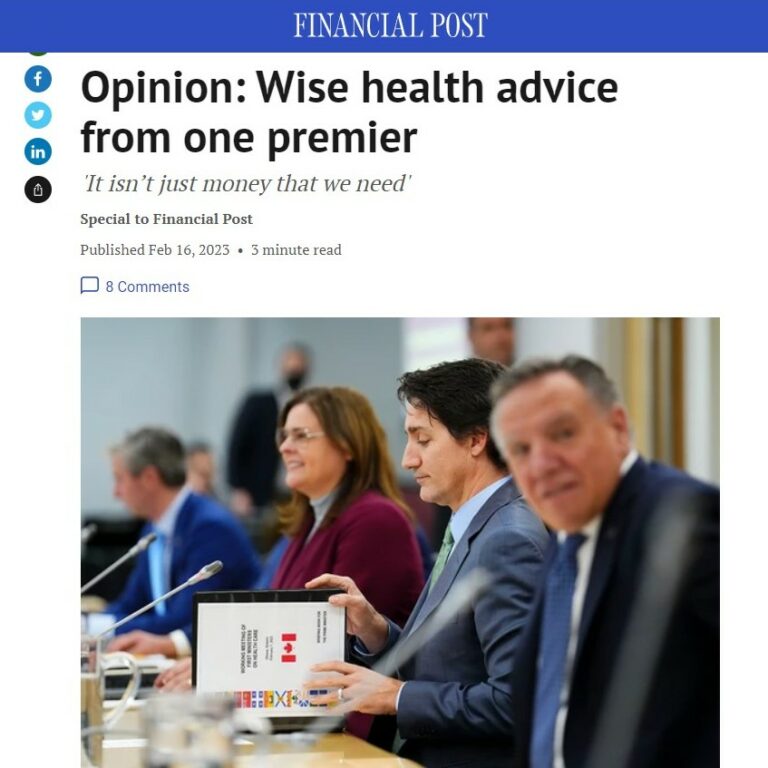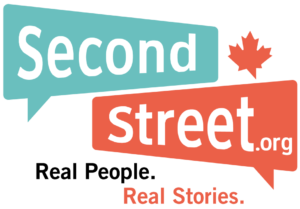FINANCIAL POST COLUMN: Wise Health Advice from One Premier

After Prime Minister Justin Trudeau announced his new health-care funding proposal, provincial premiers held a joint press conference in Ottawa to respond. One by one they spoke about “the money.” The cash. The bacon. We’ve all seen this movie before. But then, out of nowhere, a ray of light. Someone spoke up and shared words of real wisdom.
“I think what’s lost in the conversations is that it isn’t just money that we need,” the man said. Who was this choir member singing out of tune?
Before the reveal, some background. In 1991, government spending on health care in Canada worked out to $1,683 per person. As of 2021 it came in at $5,573 per person. That increase is nearly double the rate of inflation. Yet despite the big cash injection outcomes worsened. Waiting lists have been growing for decades. More and more patients are dying before their turn for surgery. We’re in a crisis and have been since before COVID — even though we spend about a third more on health care per person than the average OECD nation.
As for the mystery man, it was Dennis King, premier of Prince Edward Island, a province you don’t hear from much. For patients’ sake, however, Premier King should have been given more time at the microphone. He went on to say: “I feel the conversation over the last little while with the Council of the Federation and with the prime minister and with federal officials, we’ve led maybe Canadians to believe that money is going to fix this and that is not totally accurate. We do need money to help with innovations and to get people within the system to change what they do and maybe broaden what they do but it isn’t just about money.”
He’s 100 per cent right. To achieve better outcomes, governments need to reform their health-care systems.
Over a decade ago, Saskatchewan began aggressively tackling its waiting lists by commissioning private clinics to perform surgeries for patients. It worked. Not only did wait times fall, so did costs — anywhere from 26 to 45 per cent compared with what it would have cost the government to deliver the same services in-house.
In January, Ontario Premier Doug Ford announced that upwards of half of elective surgeries would be done in private clinics in future. Following Saskatchewan’s lead is a positive step, but why did it take so long?
Speaking of Ontario, patients in Canada’s most populous province can pay for their injured pet to receive an MRI tomorrow, but its government won’t allow them to spend those same dollars on an MRI for themselves. Other provinces have similar barriers between patients and the private surgical services many of them need. And Ottawa frowns on private care, too: in the past it has reduced funding to provincial governments for allowing private options.
Allowing patients to access private health options would actually relieve pressure on the public system. And why should governments, which already take half our earnings in taxes, decide for us how we can and cannot spend the other half? Why should it be illegal to spend our after-tax dollars on an MRI for a family member if that’s our highest priority? And for most of us, if it’s needed, it will be our highest priority.
Another reform proposed by both the Fraser Institute and Montreal Economic Institute is to change how hospitals are funded. Instead of just handing out billions of dollars based on historical formulas, fund hospitals based on their output. Incentives matter.
These are just a few options to improve health care in Canada that do not require the mindless “solution” of endless streams of tax dollars. For the sake of both underserved patients and overburdened health-care workers, provincial governments should heed Premier King and spend more time improving how they spend the dollars they have and less time begging Ottawa for more.
Colin Craig is president of SecondStreet.org, the think-tank.
This column was published in The Financial Post on February 16, 2023.
You can help us continue to research and tell stories about this issue by making a donation or sharing this content with your friends. Be sure to sign up for our updates too!


